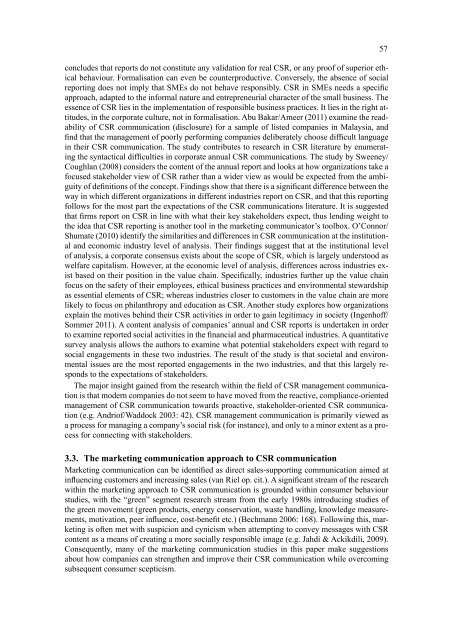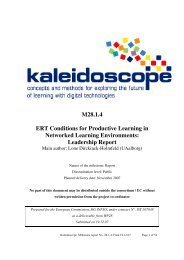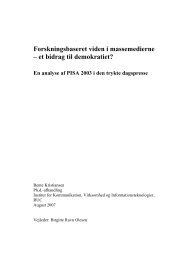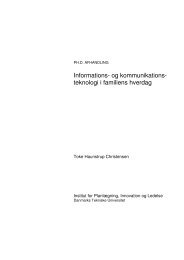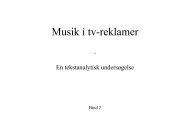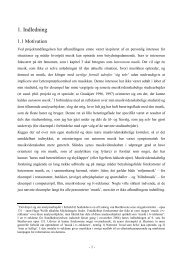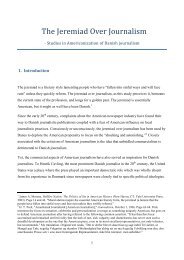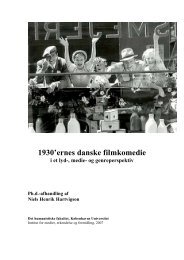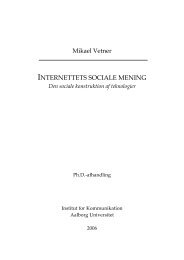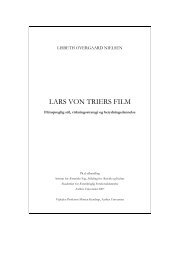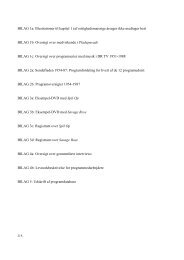Download - Hermes - Journal of Linguistics
Download - Hermes - Journal of Linguistics
Download - Hermes - Journal of Linguistics
You also want an ePaper? Increase the reach of your titles
YUMPU automatically turns print PDFs into web optimized ePapers that Google loves.
concludes that reports do not constitute any validation for real CSR, or any pro<strong>of</strong> <strong>of</strong> superior ethical<br />
behaviour. Formalisation can even be counterproductive. Conversely, the absence <strong>of</strong> social<br />
reporting does not imply that SMEs do not behave responsibly. CSR in SMEs needs a specific<br />
approach, adapted to the informal nature and entrepreneurial character <strong>of</strong> the small business. The<br />
essence <strong>of</strong> CSR lies in the implementation <strong>of</strong> responsible business practices. It lies in the right attitudes,<br />
in the corporate culture, not in formalisation. Abu Bakar/Ameer (2011) examine the readability<br />
<strong>of</strong> CSR communication (disclosure) for a sample <strong>of</strong> listed companies in Malaysia, and<br />
find that the management <strong>of</strong> poorly performing companies deliberately choose difficult language<br />
in their CSR communication. The study contributes to research in CSR literature by enumerating<br />
the syntactical difficulties in corporate annual CSR communications. The study by Sweeney/<br />
Coughlan (2008) considers the content <strong>of</strong> the annual report and looks at how organizations take a<br />
focused stakeholder view <strong>of</strong> CSR rather than a wider view as would be expected from the ambiguity<br />
<strong>of</strong> definitions <strong>of</strong> the concept. Findings show that there is a significant difference between the<br />
way in which different organizations in different industries report on CSR, and that this reporting<br />
follows for the most part the expectations <strong>of</strong> the CSR communications literature. It is suggested<br />
that firms report on CSR in line with what their key stakeholders expect, thus lending weight to<br />
the idea that CSR reporting is another tool in the marketing communicator’s toolbox. O’Connor/<br />
Shumate (2010) identify the similarities and differences in CSR communication at the institutional<br />
and economic industry level <strong>of</strong> analysis. Their findings suggest that at the institutional level<br />
<strong>of</strong> analysis, a corporate consensus exists about the scope <strong>of</strong> CSR, which is largely understood as<br />
welfare capitalism. However, at the economic level <strong>of</strong> analysis, differences across industries exist<br />
based on their position in the value chain. Specifically, industries further up the value chain<br />
focus on the safety <strong>of</strong> their employees, ethical business practices and environmental stewardship<br />
as essential elements <strong>of</strong> CSR; whereas industries closer to customers in the value chain are more<br />
likely to focus on philanthropy and education as CSR. Another study explores how organizations<br />
explain the motives behind their CSR activities in order to gain legitimacy in society (Ingenh<strong>of</strong>f/<br />
Sommer 2011). A content analysis <strong>of</strong> companies’ annual and CSR reports is undertaken in order<br />
to examine reported social activities in the financial and pharmaceutical industries. A quantitative<br />
survey analysis allows the authors to examine what potential stakeholders expect with regard to<br />
social engagements in these two industries. The result <strong>of</strong> the study is that societal and environmental<br />
issues are the most reported engagements in the two industries, and that this largely responds<br />
to the expectations <strong>of</strong> stakeholders.<br />
The major insight gained from the research within the field <strong>of</strong> CSR management communication<br />
is that modern companies do not seem to have moved from the reactive, compliance-oriented<br />
management <strong>of</strong> CSR communication towards proactive, stakeholder-oriented CSR communication<br />
(e.g. Andri<strong>of</strong>/Waddock 2003: 42). CSR management communication is primarily viewed as<br />
a process for managing a company’s social risk (for instance), and only to a minor extent as a process<br />
for connecting with stakeholders.<br />
3.3. The marketing communication approach to CSR communication<br />
Marketing communication can be identified as direct sales-supporting communication aimed at<br />
influencing customers and increasing sales (van Riel op. cit.). A significant stream <strong>of</strong> the research<br />
within the marketing approach to CSR communication is grounded within consumer behaviour<br />
studies, with the “green” segment research stream from the early 1980s introducing studies <strong>of</strong><br />
the green movement (green products, energy conservation, waste handling, knowledge measurements,<br />
motivation, peer influence, cost-benefit etc.) (Bechmann 2006: 168). Following this, marketing<br />
is <strong>of</strong>ten met with suspicion and cynicism when attempting to convey messages with CSR<br />
content as a means <strong>of</strong> creating a more socially responsible image (e.g. Jahdi & Ackikdili, 2009).<br />
Consequently, many <strong>of</strong> the marketing communication studies in this paper make suggestions<br />
about how companies can strengthen and improve their CSR communication while overcoming<br />
subsequent consumer scepticism.<br />
57


